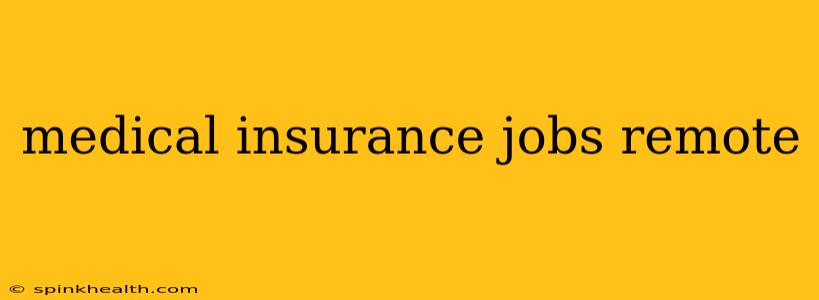The hum of the office air conditioner, the constant chatter of colleagues – these are sounds many of us associate with the workplace. But what if you could ditch the commute and enjoy the flexibility of a remote medical insurance job? It’s more attainable than you think. This guide will help you navigate the landscape of remote opportunities in this dynamic field, answering your burning questions and providing the insight you need to land your dream role.
What are the Different Types of Remote Medical Insurance Jobs?
The beauty of remote work in medical insurance is the diversity of roles. You're not limited to just one type of position. Some common options include:
-
Claims Adjusters: These professionals handle insurance claims, verifying information, and processing payments – all from the comfort of their home offices. This often involves detailed work and strong analytical skills.
-
Customer Service Representatives: Providing excellent customer service is crucial in the medical insurance industry. Remote CSRs handle member inquiries, explain policies, and resolve issues via phone and email. Empathy and patience are key here.
-
Medical Coders and Billers: These roles require meticulous attention to detail. Medical coders translate medical diagnoses into numerical codes for billing purposes, while billers handle the financial aspects of insurance claims.
-
Underwriters: Underwriters assess risk, determine eligibility for insurance plans, and set premiums. These positions often require experience and strong analytical abilities.
-
Medical Insurance Sales Representatives: While some sales roles require in-person interaction, many companies utilize remote sales representatives who connect with potential clients via phone, video conferencing, and email.
What Skills are Needed for Remote Medical Insurance Jobs?
Beyond the specific requirements of each role, several transferable skills are highly valued in remote medical insurance positions:
-
Strong Communication Skills: Whether written or verbal, clear and concise communication is paramount, especially in a remote setting where face-to-face interaction is limited.
-
Technical Proficiency: Familiarity with various software programs and platforms used in the medical insurance industry is essential.
-
Organizational Skills: Managing your time effectively and staying organized is critical when working remotely and independently.
-
Problem-Solving Skills: You'll encounter various challenges daily, so the ability to think critically and find solutions is vital.
-
Adaptability: The world of healthcare and insurance changes constantly. Being flexible and adaptable is key to success.
What Education and Experience are Typically Required?
The required education and experience vary depending on the specific job. Some entry-level positions may only require a high school diploma and on-the-job training, while others might require a bachelor's degree or relevant certifications, such as CPC (Certified Professional Coder) or CCS-P (Certified Coding Specialist-Physician). Prior experience in the medical insurance field is often beneficial, but not always mandatory.
How Can I Find Remote Medical Insurance Jobs?
The key to finding remote medical insurance jobs is to leverage online job boards, company websites, and networking. Check out sites like Indeed, LinkedIn, and Glassdoor, searching specifically for "remote" or "work from home" medical insurance jobs. Also, visit the career pages of major insurance companies and healthcare providers. Networking with professionals in the industry can also lead to hidden opportunities.
What are the Benefits of Working Remotely in Medical Insurance?
The perks of remote work in medical insurance are numerous:
-
Flexibility: Set your own hours (within reasonable limits, of course).
-
Work-Life Balance: Better manage personal and professional commitments.
-
Cost Savings: Eliminate commuting costs and expenses related to traditional office work.
-
Increased Productivity: Many people find they are more productive in a comfortable home environment.
-
Geographic Freedom: Work from anywhere with a reliable internet connection.
Are There Any Downsides to Remote Medical Insurance Jobs?
While the benefits are significant, it’s important to acknowledge potential downsides:
-
Isolation: Working remotely can sometimes feel isolating. Maintain regular communication with colleagues and participate in virtual team events.
-
Technical Issues: Reliable internet access and technology are essential for remote work. Be prepared for occasional glitches.
-
Boundaries: It's easy to blur the lines between work and personal life. Establish clear boundaries to prevent burnout.
The world of remote medical insurance jobs offers incredible opportunities for those seeking flexibility, autonomy, and a fulfilling career. By leveraging your skills, networking effectively, and understanding the nuances of remote work, you can successfully navigate this exciting landscape and achieve your professional goals.

